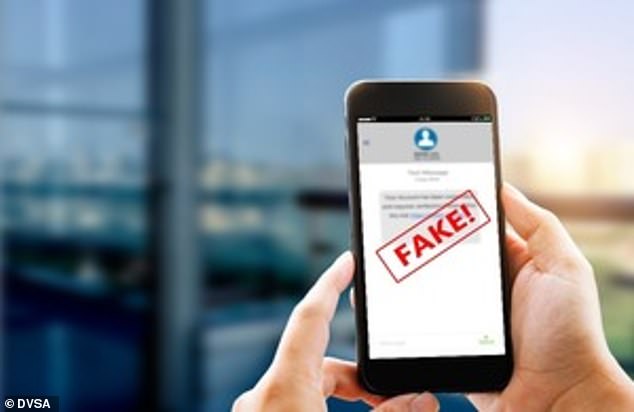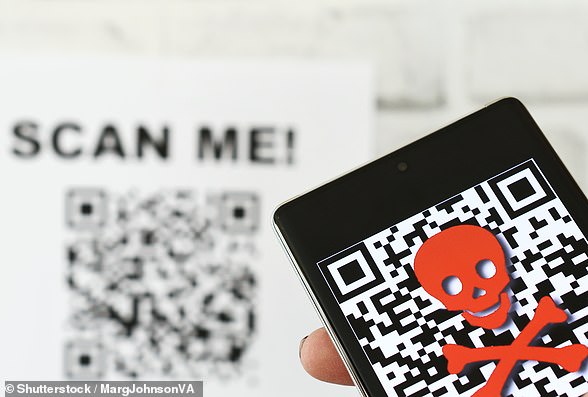Table of Contents
The Driver and Vehicle Standards Agency (DVSA) has warned the public that scammers are sending fraudulent text messages about parking to motorists.
The text tells the driver that they must pay a DVSA fake parking fine fee.
The DVSA does not issue or deal with parking fines or penalties and advises drivers to report fraudulent text messages to the National Cyber Security Centre.
The Driver and Vehicle Standards Agency (DVSA) has warned the public that scammers are sending fraudulent text messages to drivers telling them to pay a “parking penalty”.
The text message warns people that they have a “parking penalty” and that if they do not pay on time, they could be banned from driving, have to pay more or be taken to court.
The text message reads: ‘Dvsa notice to you: You have a parking ticket charge due 9/30/2024.
‘If you don’t pay your fine on time, you may be banned from driving your vehicle, have to pay more, or be taken to court.
‘Please enter your number plate in the link after reading the information. Check and pay the parking fine. Thank you again for your cooperation. Dvsa.’
As well as the DVSA not dealing with fines (the DVSA is the UK’s road safety and education body that oversees driving tests), other clues that the text is a scam include spelling mistakes and incorrect punctuation.
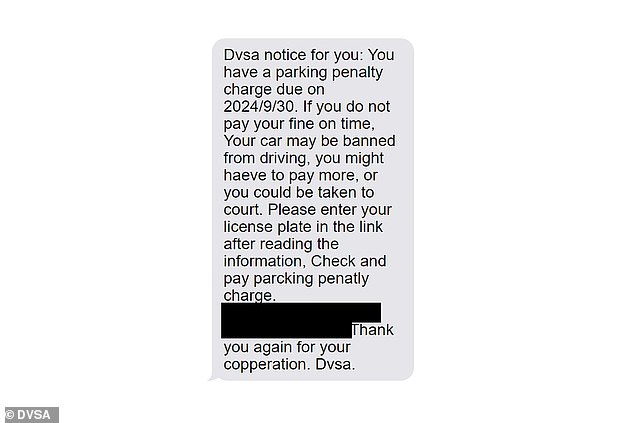
Fake: This is an image of the scam text people have been receiving.
Tips for motorists to protect themselves from scammers who text drivers
If you receive a text message like this, you can report it to the National Cyber Security Centre.
There is no need to contact DVSA if you have received the text message – this is a matter for the Cyber Security Centre to resolve.
If you have been tricked into sharing personal information with a scammer, you should take immediate steps to protect yourself by contacting the police.
You will also need to inform your bank, if you have provided such data.
If you have lost money or been a victim of a cyber attack as a result of responding to a suspicious text message, report it to the police immediately: at www.actionfraud.police.uk or by calling 0300 123 2040 (in England, Wales or Northern Ireland). Or call 101 in Scotland to contact Police Scotland.
Increase in parking scams
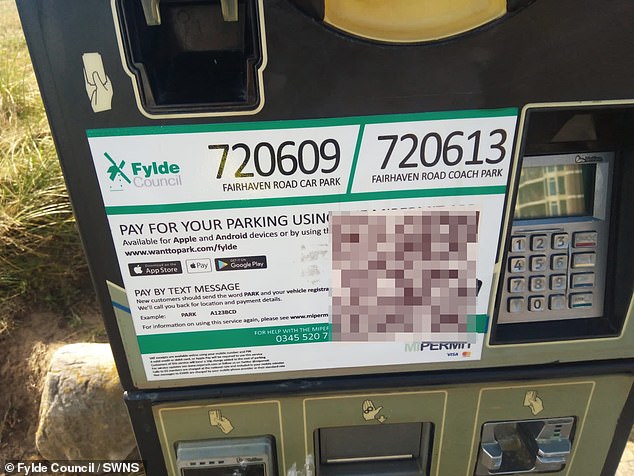
Target: An example of a scam: QR codes pasted on display machines and fare boards in Lytham St Annes, Lancs
This is just the latest parking scam; This is Money recently reported on the rise of scammers using fake QR parking codes.
‘Quishing’ is the growing criminal activity of placing fake QR codes on payment machines in car parks to defraud unsuspecting drivers by tricking them into entering credit and debit card information on fake websites.
The shift to cashless payment systems by local authorities and car park operators has accelerated the problem.
In July and August, there was a large increase in fake QR codes on parking machines in Barking and Dagenham, Northumberland, Northamptonshire, South Tyneside and Pembrokeshire, which appear to use the PayByPhone app to collect parking payments.
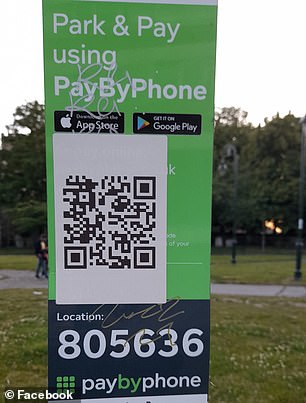
Cheeky: Scammers have pasted a printed QR code on a parking sign and if you’re in a hurry, you might get caught
RAC policy director Simon Williams said: ‘A car park is one of the last places you expect to fall victim to online fraud.
‘Unfortunately, the increasing popularity and ease of use of QR codes appears to have made drivers more vulnerable to malicious scammers.
‘For some, this sadly means that a quick response code could, in fact, be a ‘fast track’ to losing money.
“As if this parking scam wasn’t nasty enough, it can also lead to drivers being caught twice if they don’t realise they haven’t paid for parking and end up with a hefty fine from the council,” Williams continued, adding that “the safest course of action is to avoid using QR codes altogether.”
I’m a cybersecurity expert: here’s how to beat parking scammers
Virtual private network service provider NordVPN found that three-quarters of Britons do not check QR codes before scanning them, and only one in six drivers are aware that QR code scams are possible.
Adrianus Warmenhoven, cybersecurity expert at NordVPN, said: ‘In our increasingly digital landscape, even something as simple as parking a car can require the use of a smartphone to pay.
‘It’s good news to see the RAC raising awareness of the problem, but we need parking companies to take decisive action to control and stamp out these scams.
‘Before scanning a QR code in a parking lot, make sure it comes from a trusted source and check with the establishment that owns it.
‘Look for a padlock symbol in the URL box of your smartphone’s web browser which will indicate that the system is using a secure server.
‘For added security, ditch the camera app and consider using a dedicated QR code scanning app, as these can often detect malicious sites or software.
‘If a QR code redirects you to an unrelated or suspicious website, refrain from providing any personal information and leave the page immediately. You can also try calling the parking company to double-check if you’re unsure.
‘Paying by credit card is another sensible precaution, as credit card companies are obliged to refund your money unless they can prove you are trying to defraud them.’
Have you been a victim of a QR code scam? Email editor@thisismoney.co.uk
Some links in this article may be affiliate links. If you click on them we may earn a small commission. This helps us fund This Is Money and keep it free to use. We do not write articles to promote products. We do not allow any commercial relationships to affect our editorial independence.


